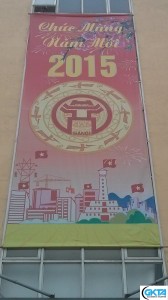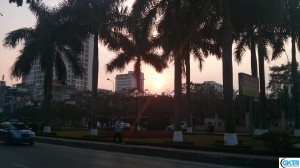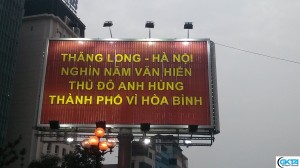Setting Expectations Across Cultures
- Still considered Hanoi.
- A beer garden in District 8, HCMC.
- Bui Vien in HCMC.
- Old Quarter in Hanoi.
- Hanoi Rock City.
- Jaspas in Lotte Center Hanoi.
- The view from the observation deck at Lotte Center Hanoi.
- Ngo Quyen, Hanoi.
- No traffic lights, no problem!
- Son Tinh Camp.
- The view from Puku’s.
- West Lake nearing rush hour.
Lately, we’ve been meeting with university students from Foreign Trade University, Diplomatic Academy of Vietnam, and Banking Academy of Vietnam—and we’ve also been encountering some newcomers in Vietnam.
We’ve previously covered the youth in Vietnam, in particular how the true potential of Vietnam is embedded in its youth and in finding creative solutions to global problems, e.g., frugal innovation. Overall, we still maintain our high aspirations for the young Vietnamese that we have encountered and even higher expectations for the future of Vietnam because of them. We have also previously covered communication here in Vietnam but this week we are going to set the stage for interactions between foreigners and locals because there can be a lot of misreading and miscommunication between cultures, especially when there is a mismatch of expectations from the onset. It’s important to point out that Vietnam itself is not homogenous–there are great differences (accents, attitudes, allowance for risk) between north, south, and central areas of the country.
From an Outsider’s Perspective
Overall, there are some very traditional aspects in Vietnam to consider; it’s a patriarch society where saving face is crucial and most sensitive subjects are handled indirectly. Social events are a dance of respect, camaraderie building, and copious amount of alcohol. In the Vietnamese language, there are different ways to address the person you are speaking to, depending on if s/he is older or younger than you, your parents, and his/her position in society or environment relative to yours. Thus, a situation that would be normal between colleagues in the west would be very different here as age and relationships would come into play if there was ever a dispute.
The following are advice and suggestions for new expats (compiled from experience, anecdotes, and research)—not all of it applies to every encounter, rather these are themes that seem to permeate through interactions here and that we have reached consensus on.
Everyday and specific problems aren’t fully addressed as they are a sign of weakness (saving face); anything that is perceived as being negative is shunned. For example, we asked a client what their hardware defect rate is for their product line. Their response was, “we aim to have a hardware defect rate of 1%.” However, that response didn’t inform us what the current hardware defect rate is.
A lack of negative points in a discussion needs exposure; things will get swept under the rug. In the worst cases, problems will be actively hidden.
Figure out when yes really means yes; get a commitment from your counterpart. Trust but verify. Don’t believe it until you see it (completion or payment). Often, we find that people here are very good at going from A-Z but they miss the required steps in the middle unless questioned and, in some cases, led down a path of logic. You will have to guide many elements of scope or else they will fall through the cracks.
Don’t listen to what people say, look at what they do.
Your author worked on a project in HCMC a couple of years ago. One of our local partners missed five deadlines in a three month period which caused multiple issues with the client. Who was more foolish? Our partner for continuing to miss deadlines or us for believing him after he missed the second deadline?
If you are working on a project beware of unreasonable timelines and expectations, especially if there is a set date for delivery (such as an event). A common tactic is to give responsibilities away close to a deadline, and then assign blame when things go awry—especially for subordinates. However, those same people will take credit when things go well. Don’t do things for free or deviate outside your scope or else you will be blamed if something goes wrong.
It’s not uncommon for local managers to request an “urgent” item the night before (via text message) for a sub 12-hour turnaround or even as an employee is walking out the door at 8:00 PM before the weekend.
Many local partners will want to proceed ad hoc and may be concerned about “protecting” the end customer. Sometimes, the price of a good or service is secondary when trying to close a deal, especially through an intermediary.
The concept of “allies” and “enemies” within an organization is very prominent in local organizations; this phenomenon can be especially noticeable at the C-level in large or public organizations. Think tree trunks and roots for each position.
Give options but not more than two; there are many masters of “getting you to do work for free” here.
You will be stared at in the streets a lot. Smile back to break the ice.
Common Questions and Phrases
In the course of meeting Vietnamese, you will be bombarded with questions about your personal life and work in Vietnam. In no particular order:
Where are you from?
Are you married?
What do you think of Vietnam?
Do you have any brothers or sisters?
Where do you live in Hanoi?
How long have you been here?
Are you an English teacher?
You’ll also have to diplomatically handle some uncommon statements (in the west), such as:
“You’re handsome.”
“I’m training to be a good wife.”
“You should find a Vietnamese girlfriend or wife.”
“You would make a good wife.”
Above all, your nationality can either be an advantage or a disadvantage—but very few people here are overtly anti-American, anti-French, or anti-Chinese (although last year’s riots are an exception).
Working Effectively with Foreigners
Foreign companies will have increasingly higher requirements for local workers as FDI amounts increase. Local consumers will also demand better customer service or brand experiences as their purchasing power increases. The following advice has been compiled from students, workers, your author, and others who have worked with locals on a variety of projects at different levels—this advice is specifically for students.
Ideas without execution are delusions.
Show up five minutes early to meetings—don’t show up late; every time someone is late then s/he has to get caught up with events that already happened.
Say “I don’t know how to do that” when you actually don’t know. It’s better to ask questions before doing something than to do it wrong the first time. And you will actually save time instead of doing things over and over again.
Be focused in meetings. And be quiet when others are talking.
Listen to the one who is speaking. Again, don’t talk over others; it’s rude.
Actually give your opinion when asked for it—somebody asked you because s/he cares and you probably have insight that the person who asked you doesn’t have.
When everyone is agreeing about an issue, try to take the opposite position—groupthink is how companies are ruined.
Ask: “what can I do to help?” Follow through. The greatest shortage of resources in Southeast Asia is quality talent who can understand “glocal” requirements, i.e., global and local.
Don’t make silly excuses for whatever reason you are late or don’t feel like working (rain or traffic). Illness, a death in the family, and/or caring for an ill or injured family member are not silly excuses.
Think critically. Be skeptical; talk is cheap.
Prioritize. Write down your goals and tell someone. Most people will be happy to help or mentor.
Say no when you actually don’t agree with something.
Work in advance to meet the deadline. Organize work smartly to have time to think, plan, do, and win.
Ask for help when you need to; not the day before a deadline. Don’t wait until the last minute, it shows a lack of respect for a person’s time.
If you see a problem, mention it and try to come up with a solution for the problem.
Don’t think outside of the box, expand your box.
Don’t ever say “cannot” or “impossible” or “so sorry, please sympathize with me.” It wastes everyone’s time, including yours.
Be confident but remain humble, always. People acting like a “big boss” and shouting and screaming at others is not viewed well in the west. Steve Jobs was an exception.
Try to keep things professional; try to keep an open mind. Don’t be sexist; don’t make fun of your teammates.
Think through ideas to the end. How will you do that? And then what comes after?
Everyone has good ideas and no one has a monopoly on good ideas.
Don’t ask people outright for tangible help: money, job, free work. Try to help them first or ask what their biggest problem is and how you can help.
People who cannot follow through cannot be trusted—this goes for expats and locals.
Trust takes a long time to build and can be lost in a moment—don’t abuse someone’s trust.
The Biggest Piece
The advice offered above is non-exhaustive and has western bias according to Hofstede’s dimensions. The best thing to do is to talk to people; if you are a newly arrived expat then you should be talking to someone new every day. If you are a student and want to know more about foreign customs then ask someone from that country. Reading about it and doing it are two different things and the best way to learn something is by doing it.
The first time you do something is the hardest–eventually you’ll get the hang of it and will be more efficient and effective at it, whether it’s communicating requirements, asking to make sure something is done, or conflict resolution (or avoidance). Like the variety of photos in the gallery, Vietnam has many faces, shapes, forms, and settings. Don’t try to stereotype or label what you see, but instead try to understand why things are the way they are–that’s way more important to do than criticizing it or condemning it. Once you understand something, then you can see where the opportunities lie–even across cultures.















